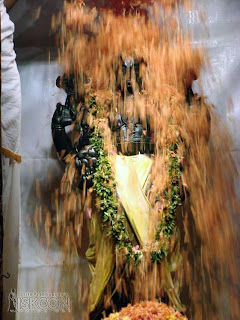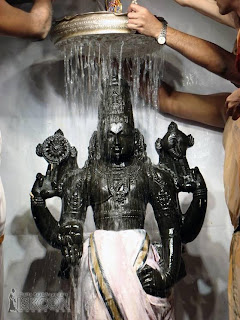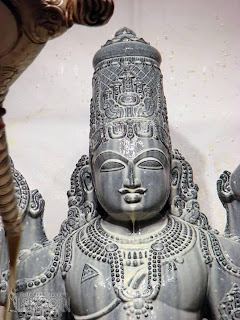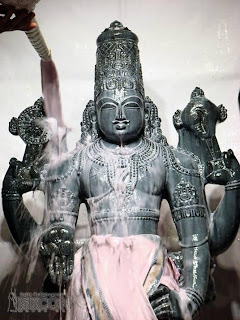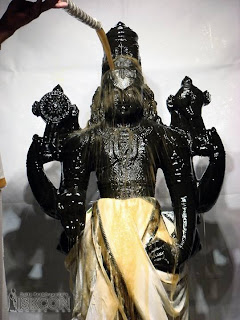
Hanuman Chalisa is in praise of Lord Hanuman written by Great Saint Thulasidas. He has praised the Lord on his powers, wonders and how he saves his devotees.
LyricsSri Guru charana saroja raj,
Nija mana mukura sudhar,
Varanau Raghuvara vimala yasa,
Jo dayaka phala char.
Meaning:With the dust of Guru’s Lotus feet, I clean the mirror of my mind and then narrate the sacred glory of Sri Ram Chandra, The Supreme among the Raghu dynasty. The giver of the four attainments of life.
LyricsBudhi heena thanu jaani ke,
Sumeerou pavana kumar,
Bala budhi vidhya dehu moheem,
Harau klesa vikar.
Meaning:Knowing myself to be ignorant, I urge you, O Hanuman, The son of Pavan! O Lord! Kindly Bestow on me strength, wisdom and knowledge, removing all my miseries and mistakes.
Lyrics: Poem 1Jaya Hanuman gnan guna sagara,
Jaya kapeesa thihu loka ujagara.
Meaning:Victory of Thee, O Hanuman, Ocean of wisdom and virtue, victory to the Lord of monkeys who is well known in all the three worlds
Lyrics: Poem 2Rama dhootha, athulitha bala dhama,
Anjani puthra pavana sutha nama,
Meaning:You, the Divine messager of Ram and repository of immeasurable strength, are also known as Anjaniputra and known as the son of the wind - Pavanputra.
Lyrics: Poem 3Maha veera vikrama bhaja rangi,
Kumathi nivara sumathi ke sangi.
Meaning:Oh Hanumanji! You are valiant and brave, with a body like lightening. You are the dispeller of darkness of evil thoughts and companion of good sense and wisdom.
Lyrics: Poem 4Kaanchan varna viraja suvesha,
Kannan kundala kunchitha kesa.
Meaning:Shri Hanumanji’s physique is golden colored. His dress is pretty, wearing ‘Kundals’ ear-rings and his hairs are long and curly.
Lyrics: Poem 5Hatha bajra aur thwajaa virajai,
Kanthe munja janehu sajai.
Meaning:Shri Hanumanji is holding in one hand a lighting bolt and in the other a banner with sacred thread across his shoulder.
Lyrics: Poem 6Shankara suvana, kesari nandana,
Theja prathapa maha jaga vandana.
Meaning:Oh Hanumanji! You are the emanation of ‘SHIVA’ and you delight Shri Keshri. Being ever effulgent, you and hold vast sway over the universe. The entire world propitiates. You are adorable of all.
Lyrics: Poem 7Vidhyavan, gunee athi chathura,
Ram kaaja karibe ko aathura.
Meaning:Oh! Shri Hanumanji! You are the repository learning, virtuous, very wise and highly keen to do the work of Shri Ram
Lyrics: Poem 8Prabhu charitha sunibhe ko rasiya,
Rama Lakshmana Sita mana basiya.
Meaning:You are intensely greedy for listening to the narration of Lord Ram’s life story and revel on its enjoyment. You ever d well in the hearts of Shri Ram-Sita and Shri Lakshman.
Lyrics: Poem 9Sookshma roopa dhari siya him dikhava,
Vikata roopa dhari Lanka jarava.
Meaning:You appeared before Sita in a diminutive form and spoke to her, while you assumed an awesome form and struck terror by setting Lanka on fire.
Lyrics: Poem 10Bheema roopa dhari asura samhare,
Ramachandra ke kaj sanvare,
Meaning:He, with his terrible form, killed demons in Lanka and performed all acts of Shri Ram.
Lyrics: Poem 11Laaya sanjeevan lashana jiyaye,
Sri Raghuveera harashi ura laye,
Meaning:When Hanumanji made Lakshman alive after bringing ‘Sanjivni herb’ Shri Ram took him in his deep embrace, his heart full of joy.
Lyrics: Poem 12Raghupati Kinhi Bahut Badaai,
Tum Mama Priya Bharat Sam Bahi.
Meaning:Shri Ram lustily extolled Hanumanji’s excellence and remarked, “You are as dear to me as my own brother Bharat”
Lyrics: Poem 13Sahastra Badan Tumharo Jas Gaave,
Asa kahi Shripati Kanth Laagave.
Meaning:Shri Ram embraced Hanumanji saying: “Let the thousand - tongued sheshnaag sing your glories”
Lyrics: Poem 14Sankadik Brahmadi Muneesa,
Narad Sarad Sahit Aheesa
Meaning:Sanak and the sages, saints. Lord Brahma, the great hermits Narad and Goddess Saraswati along with Sheshnag the cosmic serpent, fail to sing the glories of Hanumanji exactly.
Lyrics: Poem 15Jam Kuber Digpal Jahan Te,
Kabi Kabid Kahin Sake Kahan Te
Meaning:What to talk of denizens of the earth like poets and scholar’s ones etc even Gods like Yamraj, Kuber, and Digpal fail to narrate Hanman’s greatness in toto.
Lyrics: Poem 16Tum Upkar Sugrivahi Keenha,
Ram Miali Rajpad Deenha
Meaning:Hanumanji! You rendered a great service for Sugriva, It was you who united him with SHRI RAM and installed him on the Royal Throne.
Lyrics: Poem 17Tumharo Mantro Bibhishan Maana,
Lankeshwar Bhaye Sab Jag Jaana.
Meaning:By heeding your advice, Vibhushan became Lord of Lanka, which is known all over the universe.
Lyrics: Poem 18Juug Sahastra Jojan Par Bhaanu,
Leelyo Taahi Madhur Phal Jaanu
Meaning:Hanumanji gulped, the SUN at distance of sixteen thousand miles considering it to be a sweet fruit.
Lyrics: Poem 19Prabhu Mudrika Meli Mukha Maaheen,
Jaladhi Langhi Gaye Acharaj Naheen.
Meaning:Carrying the Lord’s ring in his mouth, he went across the ocean. There is no wonder in that.
Lyrics: Poem 20Durgam Kaaj Jagat Ke Jeete,
Sugam Anugrah Tumhre Te Te.
Meaning:Oh Hanumanji! All the difficult tasks in the world are rendered easiest by your grace.
Lyrics: Poem 21Ram Duware Tum Rakhavare,
Hot Na Aagya Bin Paisare.
Meaning:Oh Hanumanji! You are the sentinel at the door of Ram’s mercy mansion or His divine abode No one may enter without your permission.
Lyrics: Poem 22Sab Sukh Lahen Tumhari Sarna,
Tum Rakshak Kaahu Ko Darnaa.
Meaning:By your grace one can enjoy all happiness and one need not have any fear under your protection.
Lyrics: Poem 23Aapan Tej Samharo Aapei,
Tanau Lok Hank Te Kanpei
Meaning:When you roar all the three worlds tremble and only you can control your might.
Lyrics: Poem 24Bhoot Pisaach Nikat Nahi Avei,
Mahabir Jab Naam Sunavei.
Meaning:Hanumanji’s name keeps all the Ghosts, Demons & evils spirits away from his devotees.
Lyrics: Poem 25Nasei Rog Hare Sab Peera,
Japat Niranter Hanumant Beera
Meaning:On reciting Hanumanji’s holy name regularly all the maladies perish the entire pain disappears.
Lyrics: Poem 26Sankat Te Hanuman Chhudavei,
Man Kram Bachan Dhyan Jo Lavei.
Meaning:Those who remember Hanumanji in thought, word and deed are well guarded against their odds in life.
Lyrics: Poem 27Sub Par Ram Tapasvee Raaja,
Tinke Kaaj Sakal Tum Saaja
Meaning:Oh Hanumanji! You are the caretaker of even Lord Rama, who has been hailed as the Supreme Lord and the Monarch of all those devoted in penances.
Lyrics: Poem 28Aur Manorath Jo Koi Lave,
Soi Amit Jivan Phal Pave.
Meaning:Oh Hanumanji! You fulfill the desires of those who come to you and bestow the eternal nectar the highest fruit of life.
Lyrics: Poem 29Charo Juung Partap Tumhara,
Hai Parsiddha Jagat Ujiyara.
Meaning:Oh Hanumanji! Your magnificent glory is acclaimed far and wide all through the four ages and your fame is radiantly noted all over the cosmos.
Lyrics: Poem 30Sadho Sant Ke Tum R akhvare,
Asur Nikandan Ram Dulare.
Meaning:Oh Hanumanji! You are the savior and the guardian angel of saints and sages and destroy all the Demons; you are the seraphic darling of Shri Ram.
Lyrics: Poem 31Ashta Siddhi Nau Nidhi Ke Data,
Asa Bar Din Janki Mata.
Meaning:Hanumanji has been blessed with mother Janki to grant to any one any YOGIC power of eight Sidhis and Nava Nidhis as per choice.
Lyrics: Poem 32Ram Rasayan Tumhare Pasa,
Sadaa Raho Raghupati Ke Dasa.
Meaning:Oh Hanumanji! You hold the essence of devotion to RAM, always remaining His Servant.
Lyrics: Poem 33Tumhare Bhajan Ramko Pavei.
Janam Janam Ke Dukh Bisravei.
Meaning:Oh Hanumanji! Through devotion to you, one comes to RAM and became free from suffering of several lives.
Lyrics: Poem 34Anta Kaal Raghubar Pur Jai,
Jahan Janma Hari Bhakta Kahai.
Meaning:After death he enters the eternal abode of Sri Ram and remains a devotee of him, whenever, taking new birth on earth.
Lyrics: Poem 35Aur Devata Chitt Na Dharai,
Hanumant Sei Sarva Sukh Karai
Meaning:You need not hold any other demigod in mind. Hanumanji alone will give all happiness.
Lyrics: Poem 36Sankat Kate Mitey Sab Peera,
Jo Sumirei Hanumant Balbeera
Meaning:Oh Powerful Hanumanji! You end the sufferings and remove all the pain from those who remember you.
Lyrics: Poem 37Jai Jai Jai Hanuman Gosai
Kripa Karahu Gurudev Ki Naiee
Meaning:Jai–Jai–Jai–Lord Hanumanji! I beseech you Honor to bless me in the capacity of my supreme ‘GURU’ (teacher).
Lyrics: Poem 38Jo Sat Baar Paath Kar Koi,
Chhutahi Bandi Maha Sukh Hoi.
Meaning:One who recites this Hanuman Chalisa one hundred times daily for one hundred days became free from the bondage of life and death and enjoys the highest bliss at last!
Lyrics: Poem 39Jo Yah Padhe Hanuman Chalisa,
Hoy Siddhi Sakhi Gaurisa
Meaning:As Lord Shankar witnesses, all those who recite Hanuman Chalisa regularly are sure to be benedicted
Lyrics: Poem 40Tulsidas Sada Hari Chera,
Keeje Nath Hriday Mah Dera.
Meaning:Tulsidas always the servant of Lord prays. “Oh my Lord! You enshrine within my heart!”



